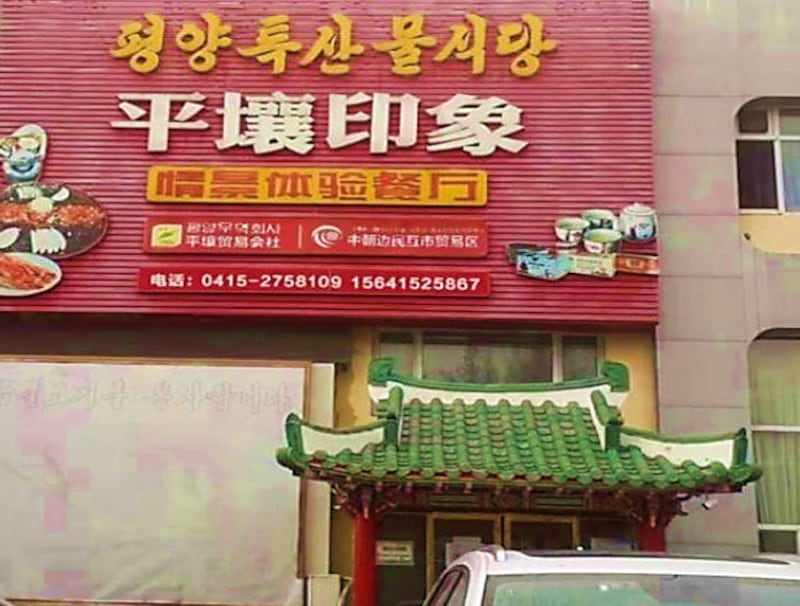A North Korean restaurant in China is forcing female waitstaff to work without facemasks even amid reports that the new Omicron coronavirus variant is spreading across the globe, sources in China told RFA.
North Korean restaurants are used by Pyongyang as a major source of foreign cash. The main attraction often is not the food, but the young women from Pyongyang who serve it and also dance and play musical instruments to entertain customers.
The women are usually college students with an arts background from the North Korean capital. They are sent abroad for at least a year while the lion’s share of their pay is sent to their government.
In the Chinese city of Dandong, on the border with North Korea, there are about 20 such restaurants. The waitresses/entertainers employed at at least one of them must perform barefaced because managers believe that masks would hide their beauty, a Chinese citizen of Korean descent told RFA’s Korean Service Nov. 29.
“Today I went to the Pyongyang Specialties Restaurant in downtown Dandong with my friend and I was surprised to see the ladies dancing and playing musical instruments for customers and collecting tips from them and they were not wearing masks,” said the source, who requested anonymity for security reasons.
“People in Dandong are nervous about the news that the new Omicron coronavirus variant, which was discovered in South Africa, is spreading these days. I am worried that the Pyongyang ladies who performed all day without masks could become infected,” the source said.
Pyongyang Specialties is known to employ about 40 people, including 20 young female performers.
The source said he was alarmed by the maskless women working so closely to customers, so he asked a friend who is close to the restaurant’s manager to get an explanation.
“My friend said the manager ordered them to take off their masks because they have to fully show their faces to attract customers,” the source said.

The manager is an official from Pyongyang, and he sends profits monthly to the North Korean government. Pyongyang Specialties had been a popular venue in Dandong before it closed in February 2020 due to the pandemic. Although it reopened in March this year, only a fraction of its customers has returned. Managers are trying everything they can to attract them, the source said.
“They have single-person rooms and multi-person rooms, and customers can be seated according to their requests. Then they can order food and private performances,” the source said.
“If you order a private performance, which costs a lot, the Pyongyang ladies come into your room and dance or play musical instruments,” the source said.
Customers can expect to pay 100 yuan (U.S. $15.71) per song, whether the waitress is dancing or playing an instrument, another ethnic Korean from Dandong, who visited Pyongyang Specialties the previous day, told RFA.
“We were in a two-person room and ordered a solo dance and a solo recital along with our food. The ladies danced in our room without masks until the end of the meal,” said the second source, who requested anonymity to speak freely.
“Pyongyang Specialties is not the only restaurant in Dandong offering performances by female waitstaff. They also have it every evening at the Pyongyang Koryo Restaurant and the Ryugyong Restaurant, and they don’t wear masks in front of customers there either, so I am worried that they will get infected,” the second source said.
The source said he was angry that the North Korean government seemingly does not care about the health of the young women.
“The North Korean authorities are sucking up all the foreign currency earned by these women, who are made to perform without masks as this new Omicron variant is spreading worldwide,” the source said.
Following the adoption of UN Security Council Resolution 2397 in December 2017, all North Korean workers abroad were supposed to have been repatriated by the end of 2019, and host countries were forbidden from issuing new working visas.
North Korea has been able to get around this by sending workers to neighboring countries on student visas.
Pyongyang had hoped to continue doing this beyond 2019, but the coronavirus pandemic put a snag in those plans when it prompted North Korea and China to seal their border in January 2020.
According to unofficial statistics, at one time, there were 100,000 North Korean workers in China, but now there are estimated to be only about two or three thousand around Dandong, and its surrounding Liaoning Province, the second source said.
Translated by Leejin Jun. Written in English by Eugene Whong.
